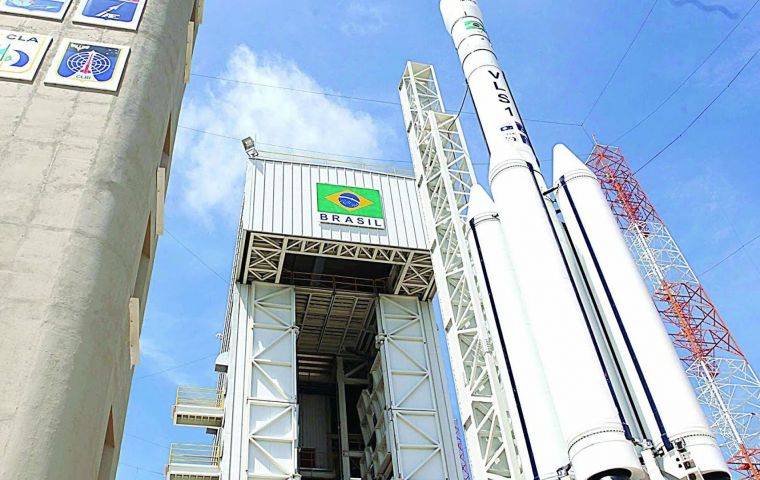MercoPress. South Atlantic News Agency
South Korea and Brazil developing space rocket industry; first launch next month
 During the first week of November, a break bulk operation was carried out to unload rocket parts, a cargo that had never been seen in the Port of Santos
During the first week of November, a break bulk operation was carried out to unload rocket parts, a cargo that had never been seen in the Port of Santos A South Korean space startup for small launch vehicles, Innospace has signed a commercial contract to launch a Brazilian military payload, a symbolic win for the burgeoning space exploration industry from the Asian country.
Under the contract signed with the Brazilian Department of Aerospace Science and Technology (DCTA), Innospace will conduct its first suborbital test flight of HANBIT-TLV to carry an inertial navigation system called SISNAV for the Brazilian Air Force at the Alcantara Launch Center in Brazil in December this year.
Precisely during the first week of November, a break bulk operation was carried out to unload rocket parts, a cargo that had never been seen in the Port of Santos. About 15 professionals from the DP World terminal assisted in the unloading of the cargo, which was hoisted from the ship.
The goods arrived in Brazil on November 3rd on Hyundai Grace, owned by Hyundai, weighing more than 100 tons. It was placed in flat rack containers (specific containers for overweight loads). The freight contained launch pad parts, toolkits, lifting structures, and vehicles.
Asia Shipping was in charge of the operation’s storage management, which, in partnership with the terminal, presented a logistics solution for this operation.
The cargo left the Port of Busan in South Korea and is destined for the launch center in Alcântara, a city neighboring São Luís, the capital of Maranhão.
The Korean company is developing HANBIT, a small satellite launcher powered by its hybrid 15-ton rocket engine. The test launch marks its first suborbital test flight to validate the first stage engine of HANBIT-Nano, a 2-stage small satellite launcher capable of carrying a 50kg payload. The 16.3-meter test rocket weighs 9.5 tons and will be thrust by a single 15-ton engine.
SISNAV is a navigation device that measures the flight position, speed, and attitude of the rocket and the test launch will enable DCTA to verify if the device works properly in takeoff and during the trans-atmospheric flight.
Korea sees a growing list of space rocket and satellite startups in the private sector. NARA Space Technology, a startup dedicated to small satellites, said the company is scheduled to launch its first satellite on Space X Falcon 9 next year




Top Comments
Disclaimer & comment rulesCommenting for this story is now closed.
If you have a Facebook account, become a fan and comment on our Facebook Page!